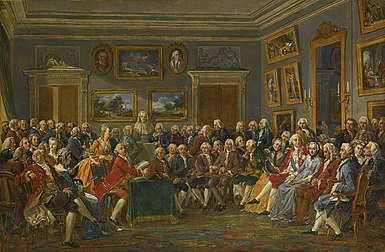 In his new tome, The Enlightenment and the Pursuit of Happiness, author Ritchie Robertson points out that, in the end, for all its focus on the virtues of an intellectual adventure apart from the aegis of God, the Enlightenment was ultimately about developing a new way to find happiness. When I consider the tremendous upheavals happening around the world today--an earthquake and tropical storm in Haiti, the Taliban takeover of Afghanistan, wildfires and flooding around the planet, and much, much more--I realize, more than ever, that when people make happiness the sole object of their existential quest, they will likely never really find it. The Enlightenment is a case in point: its quest ended, at the close of the nineteenth century, in despair.
In his new tome, The Enlightenment and the Pursuit of Happiness, author Ritchie Robertson points out that, in the end, for all its focus on the virtues of an intellectual adventure apart from the aegis of God, the Enlightenment was ultimately about developing a new way to find happiness. When I consider the tremendous upheavals happening around the world today--an earthquake and tropical storm in Haiti, the Taliban takeover of Afghanistan, wildfires and flooding around the planet, and much, much more--I realize, more than ever, that when people make happiness the sole object of their existential quest, they will likely never really find it. The Enlightenment is a case in point: its quest ended, at the close of the nineteenth century, in despair.
Only when we frame our desire for happiness in the far more fundamental desire for human wholeness, a wholeness we cannot possibly, on our own, determine, do we find what happiness most is.
Put another way, as a recent article in the New Yorker opines, rationality, be it about virtue or happiness, is not the primary fuel of human joy and meaning. Rather, it is agreeing to embrace life as an adventure whose fullness we will never be able to measure, yet an adventure entirely worth pursuing because, and only because, it is an adventure pursued in a meaningful world.
For unless we grasp life as a pursuit that is given to us, and not the other way around, that we find it--and happiness as well.
Thank goodness for the intellect, thank goodness for the heart; thanks most, however, for a world we did not make.
By the way, I'll be traveling yet again (as Scottish naturalist John Muir once said, the "mountains are calling me") for the next week and a bit beyond. Talk to you in September!
No comments:
Post a Comment